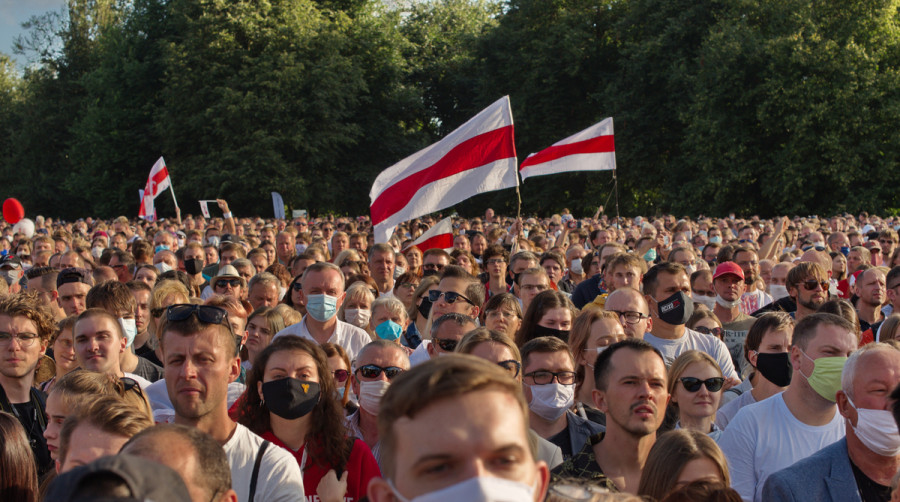Columns
The economic factor in Belarus
If Lukashenko falls, Belarus will need an IMF programme as soon as a new government is installed.
Anders Åslund
Following a fraudulent election on August 9, Belarusian President Alexander Lukashenko’s authoritarian rule may soon come to an end. Massive protests are sweeping the country, and workers from many critical sectors going on strike. And if Lukashenko falls, Belarus’s prospects for establishing a normal market economy are surprisingly strong.
Under Lukashenko, Belarus has maintained a Soviet-style, state-dominated economy that has been stagnating since 2012. Lukashenko, in power since 1994, has concerned himself with nothing other than remaining in charge and enabling his family and a close circle of cronies to enrich themselves. The public sector comprises three-quarters of the economy, which is highly dependent on heavy industry and dominated by just a few big state-owned enterprises (SOEs). The five most important enterprises—the potash company Belaruskali, the two largest oil refineries, the Minsk Tractor Works (MTZ), and the Minsk Automobile Plant (MAZ)—tend to be subsidised and inefficient, and the economy overall is heavily regulated.
Belarus’s economy has remained highly dependent on Russia. Its low-quality industrial goods are not competitive in the West, so it relies on Russia to buy them, while selling the West potash and refined oil. Until recently, Russia was subsidising the Belarusian economy by furnishing cheap energy worth some 10 percent of the latter’s GDP. But, with bilateral relations deteriorating in recent years, the Kremlin has gradually eliminated these subsidies in order to pressure Lukashenko’s regime.
Lukashenko has said that he wants all Belarusians to earn an average wage of $500 per month. But, because that is more than the economy can support, the country has suffered recurring foreign-exchange crises. In 2009-10, Belarus received a bailout from the International Monetary Fund, but the government violated the terms of the arrangement and has since received no funding. By the end of 2011, inflation had surged to 109 percent, at which point Russia came to Lukashenko’s assistance.
Since then, Lukashenko has tried unsuccessfully to appeal to both Russia and the West for financial support. For the European Union, Belarus is a delicate issue. While EU leaders want to defend democratic principles, which implies punishing Lukashenko and his cronies for their repeated violations, they want to maintain some leverage in the country, and thus have been careful not to force Lukashenko into Russian President Vladimir Putin’s arms.
After Lukashenko released all of Belarus’s political prisoners in 2016, the EU lifted its personal sanctions against him, and the IMF, the World Bank, and the European Bank for Reconstruction and Development (EBRD) started cautiously re-engaging with the country. The United States, however, has maintained its personal sanctions against Lukashenko.
The Belarusian economy cries out for liberalisation and privatisation, and it has the basic ingredients for launching such a process. The country has many assets, and it has maintained the best of the Soviet education system, offering excellent training in mathematics and natural sciences. Despite being under authoritarian rule, Belarus has become the home of a substantial software industry. And many it the large diaspora are ready to return when the time is right.
Moreover, Belarus stood out in the Soviet era as one of the best functioning of the 15 Union Republics, and that has remained true, with Lukashenko tolerating capable technocrats across all ministries. As a result, Belarus still has the best state administration of any former Soviet republic, including a competent central bank and ministry of finance. To take one recent example, while Lukashenko was dismissing the Covid-19 pandemic, the Ministry of Health was reporting data on cases meticulously to the World Health Organisation. Insofar as there is political rot in Belarus, it seems to be concentrated mostly at the very top of the system.
Not surprisingly, international investors have largely avoided Belarus (though it did manage to raise $1.25 billion in Eurobonds in late June). But precisely because Lukashenko has never been able to attract much international financing, the country’s total public debt amounts to only $18 billion—or 29 percent of GDP—according to the finance ministry.
With annual inflation under control, at about 5 percent, and with all the relevant international financial institutions already re-engaged, Belarus is well positioned to make the shift to a properly functioning market economy. Under new leadership, it should be able to attract enough international funding to maintain macroeconomic stability, and its well-educated, highly disciplined workforce would finally be able to realise its potential. Fortunately, lifting the existing price regulations on around one-fifth of Belarusian consumer goods and liberalising domestic trade should be relatively easy. Belarus’s strong macroeconomic institutions can manage the inflationary pressure.
Subsidies to SOEs will need to be curbed as well. Here, too, Belarus benefits from the fact that, unlike other post-Soviet countries, there are no oligarchs and little sign of state capture by big businessmen. Most of the complaints about corruption are concentrated within the narrow circle surrounding Lukashenko.
But these starting conditions could make privatisation more difficult, simply because there are no big private companies to serve as a model. If the bulk of inefficient SOEs are sold on the market, Belarusians fear that risk-loving Russian businessmen will swoop in to snatch them all up at fire-sale prices.
After all, the Russian potash company Uralkali has long tried to take over Belaruskali, and the Russian petrochemical giants Rosneft and Lukoil have their eyes on Belarus’s two big oil refineries. Given these risks, the best option is probably to give away most enterprises in the form of individual shares to their current employees.
Whatever is decided, the West should stay engaged. If Lukashenko falls, Belarus will need an IMF programme as soon as a new government is installed, and the World Bank and the EBRD would be needed to assist with deregulation and privatisation.
The EU will also have a role to play. It should welcome a new government by activating its Eastern Partnership programme for Belarus, and invite Belarusian students to participate in the Erasmus student-exchange programme. The importance of such civilian engagement in deterring or neutralising Russian interference must not be underestimated.
***
What do you think?
Dear reader, we’d like to hear from you. We regularly publish letters to the editor on contemporary issues or direct responses to something the Post has recently published. Please send your letters to [email protected] with "Letter to the Editor" in the subject line. Please include your name, location, and a contact address so one of our editors can reach out to you.




 9.89°C Kathmandu
9.89°C Kathmandu















